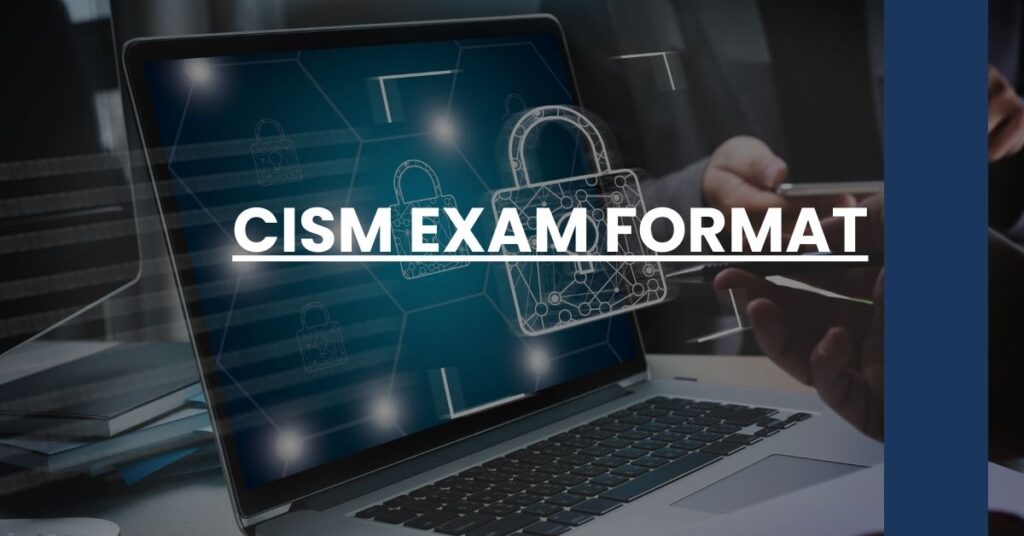The CISM exam format consists of a 4-hour test with 150 multiple-choice questions. It’s designed to measure expertise in key areas of information security management.
In this article, you will explore:
- The specific content domains covered by the CISM exam
- The nature of questions to expect
- Strategies for successful exam preparation
If you’re planning to certify your information security management skills with the CISM exam, reading on will put you on the right track to achieving your goal.
- Introduction to CISM Certification
- Overview of the CISM Exam Format
- Detailed Breakdown of the CISM Exam Sections
- Understanding the CISM Question Style
- Exam Registration and Scheduling Process
- CISM Exam Eligibility and Prerequisites
- Policies and Rules on Exam Day
- The CISM Exam Cost and Retake Policy
- Tips for Preparing for the CISM Exam
- Conclusion: Getting Ready for the CISM Challenge
Introduction to CISM Certification
In today’s digital era, safeguarding information assets is paramount. This is where the Certified Information Security Manager (CISM) certification comes into play. Offered by ISACA, an international professional association focused on IT governance, the CISM certification is globally recognized as a standard of achievement for those who manage, design, oversee, and assess an enterprise’s information security. As you consider elevating your career in information security management, attaining your CISM certification showcases your commitment to excellence and is a testament to your expertise in the field.
What You Gain from CISM:
- Recognition: CISM is one of the top credentials employers seek in information security management.
- Credibility: It asserts your ability to manage and protect information assets effectively.
- Knowledge: Equip yourself with the latest best practices in information security management.
- Advancement: It prepares you for higher leadership roles and can potentially increase your earning potential.
Overview of the CISM Exam Format
Understanding the CISM exam format is crucial for your certification journey. The exam is a comprehensive assessment of your knowledge and expertise in information security management. Let’s dissect what you can expect:
Exam Composition:
- Question Type: Multiple-choice questions that demand critical thinking and problem-solving skills.
- Number of Questions: A total of 150 questions to conquer.
- Time Allotted: You are given a generous four hours to complete the examination.
- Scoring Range: Scores range from 200 to 800, with 450 as the minimum passing score.
Embrace this challenge with confidence, knowing that a structured and strategic study plan can lead you to success. Remember, preparation is key when facing the intricate scenarios and complex questions within the CISM exam.
Detailed Breakdown of the CISM Exam Sections
To truly excel in the CISM exam, a deep dive into each domain is necessary. Here is how the exam is segmented, reflecting the diverse landscape of information security management:
- Information Security Governance (24%): At the heart of strategic leadership, this domain focuses on establishing and maintaining a framework to ensure that information security strategies align with organizational goals and objectives.
- Information Risk Management (30%): A critical element of decision-making, this domain delves into identifying and managing information security risks to achieve business objectives.
- Information Security Program Development and Management (27%): This area gauges your aptitude in creating and overseeing information security programs that are in harmony with broader business goals.
- Information Security Incident Management (19%): Preparedness is key, and this domain assesses your efficacy in planning, establishing, and managing detection, investigation, and response to information security incidents.
By dissecting the components of ISACA’s exam content outline, you gain insight into the core competencies measured by the CISM exam. Use this knowledge to pinpoint areas for focused study and skill development.
Understanding the CISM Question Style
Approaching the CISM exam without understanding the nature of its questions is akin to navigating uncharted waters. Expect scenario-based questions that mirror the complexities you will encounter in real-life information security management roles. These questions, while challenging, are designed to assess your ability to apply concepts in practical, on-the-job situations.
Additionally, here are some of the characteristics you can anticipate:
- Application-Oriented: Test your ability to apply knowledge rather than just recalling facts.
- Integrative Scenarios: Questions that require you to integrate various pieces of knowledge and information.
- Analytical Challenges: The CISM exam will push you to analyze and evaluate situations to determine the best course of action.
Your study regime should incorporate a mix of theoretical review and practical application exercises, such as those offered by ISACA’s CISM preparation resources, to best equip you for the question style you will face.
Exam Registration and Scheduling Process
The path to scheduling your CISM exam is straightforward. You can register online, with the flexibility to choose a time slot that best accommodates your study plan and personal schedule. With a plethora of testing centers globally—and an online proctoring option—the power to take the exam from a location that is convenient for you is truly yours.
Key Steps to Take:
- Log In or Create an Account: Start by logging into your ISACA account or creating a new one.
- Select Your Exam and Time: Pick your CISM exam session and desired time from available slots.
- Choose the Mode: Decide whether to take your exam at a physical PSI testing center or opt for the remote proctoring option for added convenience.
Remember, the registration is a milestone in your certification journey, marking the transition from aspirant to candidature. Embracing this stage with deliberate choice will set the tone for your road ahead to CISM certification.
CISM Exam Eligibility and Prerequisites
Before you set sail on your CISM voyage, it’s essential to ensure you meet the necessary eligibility criteria. The CISM certification is designed for experienced information security managers and professionals seeking to advance their careers. Here’s what ISACA requires:
- Work Experience: A minimum of five years of work experience in information security, including three years in managerial positions linked to the CISM job practice areas. ISACA offers waivers for certain education or related certifications that can reduce this requirement by up to two years.
- Ethical Conduct: Agreement to adhere to the ISACA’s Code of Professional Ethics, demonstrating your commitment to acting with integrity in your professional conduct.
To learn more about these requirements and potential waivers, I encourage you to delve into the detailed criteria listed on the ISACA eligibility page.
Policies and Rules on Exam Day
Alright, you’ve studied hard and are ready to tackle the CISM exam. But before you do, it’s important to familiarize yourself with the exam day protocol. The rules are simple but strict, and here’s what you need to keep top of mind:
- Identification: Bring at least one form of valid government-issued ID, which includes your photograph and signature. This could be your driver’s license, passport, or military ID.
- Arrival: Plan to arrive at the testing center at least 30 minutes before your scheduled appointment. This will give you ample time to check-in and settle your nerves.
- During the Exam: You must comply with the Test Center regulations regarding personal items, breaks, and communication with others.
Do take time to review the full list of exam day policies on ISACA’s exam details page to make sure there are no surprises on your big day.
The CISM Exam Cost and Retake Policy
Investing in your CISM certification does come with a price tag. However, consider it an investment in your professional future. Exam fees vary depending on whether you’re an ISACA member or non-member, with members benefiting from a discounted rate.
If your initial attempt doesn’t go as planned, don’t fret. ISACA provides a retake policy allowing you to sit for the exam again after a specified period. You will need to pay a retake fee, but this gives you another shot at success. For detailed cost breakdowns and the retake policy, check out the CISM FAQs.
Tips for Preparing for the CISM Exam
Preparing effectively for the CISM exam can be a daunting task, but with the right strategies, you can tackle it with confidence. Here are some tips for forging your pathway to success:
- Understand the CISM Exam Format: A thorough grasp of how the exam is structured is crucial. The exam’s 4-hour duration and 150 multiple-choice questions mean you’ll need both endurance and expertise.
- Use Official Materials: Employ study guides and materials provided by ISACA. These resources are specifically designed to align with the exam’s content and structure.
- Practice Tests: Take advantage of practice tests to familiarize yourself with the exam environment and question style. Analyzing your practice test results can highlight areas where you need additional study.
- Training Courses: Consider enrolling in formal training courses offered by ISACA or accredited third parties. These can provide structured learning and insights from seasoned instructors.
For the most direct route to CISM exam preparation resources, visit ISACA’s CISM preparation page.
Conclusion: Getting Ready for the CISM Challenge
Arming yourself with knowledge of the CISM exam format and what lies ahead is your first step toward conquering this challenge. Remember, the journey to CISM certification is not just about passing an exam – it’s about demonstrating your mastery and commitment to the field of information security management.
As you embark on this journey, take each step with purpose and use the resources at your disposal to their fullest potential. The achievement of CISM certification awaits, and with it, the recognition as a true leader in information security.
Good luck, and remember: preparation, practice, and perseverance are your allies in meeting the CISM exam format head-on and excelling in your information security career.

